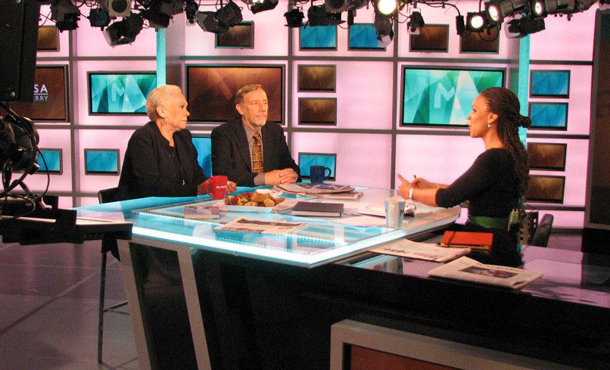Gather at the Table, a book about two individuals exploring their vastly different histories – one being an African-American woman descended from slavery and the other a European-American man descended from slave owners and traders – is garnering national attention, with Barnes and Noble making it one of its monthly picks and radio and TV stations focusing on the topic.
Authors Sharon Leslie Morgan and Tom DeWolf, who met at Eastern Mennonite University (EMU),  launched Gather at the Table at EMU in early October 2012. A couple of weeks after this launch, the two were interviewed for “Race Talk” with Melissa Harris-Perry on MSNBC. This appearance that boosted the sales of their book from around #40,000 to #149 on Amazon.com, with the book listed among Amazon’s “Movers & Shakers.” Random House also recommended the book for its list of new freshman-year readings.
launched Gather at the Table at EMU in early October 2012. A couple of weeks after this launch, the two were interviewed for “Race Talk” with Melissa Harris-Perry on MSNBC. This appearance that boosted the sales of their book from around #40,000 to #149 on Amazon.com, with the book listed among Amazon’s “Movers & Shakers.” Random House also recommended the book for its list of new freshman-year readings.
The book uses a joint journey through 27 states over three years – visiting ancestral grounds, courthouses, plantations, and civil rights sites – as a framework for exploring “the journey toward understanding and peace and reconciliation . . . understanding how slavery affected the psyche of everyone who still lives in America today and how it informs the social structures that govern our lives,” as Morgan explained in a Jan. 7, 2013, interview for “Weekday” on KUOW, Seattle’s NPR station.
“I think what we were trying to do is to look at things from both sides of the equation as a black person and a white person, and a man and a woman, and people who were in opposition in a lot of ways,” she said.
Morgan is a black woman from Chicago’s South Side, a descendant of slaves on both sides of her family. She speaks of living much of her life with a deep fear of white people. DeWolf is a white man from rural Oregon, a descendant of a slave-trading dynasty.
Opposition to Reconciliation
“The intense and non-trusting relationships were so very fragile and suspect at the beginning of the journey but gradually they were able to begin to reach out to each other in order to understand their misunderstandings regarding each race and reach a mutual respect and love,” posted a reviewer on amazon.com on Dec. 20, 2012. That reviewer was one of nine, all giving the book a five-star rating as of Jan. 9, 2013.
Morgan and DeWolf met at Coming to the Table, a program launched by EMU’s Center for Justice and Peacebuilding in 2006 with the hopes of bringing together descendants of slaveholders and enslaved people to explore history, uncover truths, build relationships, promote healing, and inspire action for a more just society.
The new book credits teachings by both STAR (Strategies for Trauma Awareness and Resilience) and Coming to the Table, each developed out of the Center for Justice and Peacebuilding at EMU. As a result, the authors are dedicating part of the book’s royalties to EMU’s work in this field.
Hope Springs at EMU
“The actions of one or two people rarely make a significant difference in the world,” wrote Morgan and DeWolf. “But the commitment of many people, acting individually and collectively, has great potential.
“Hope springs when people take the STAR training: when members of Coming to the Table congregate on a conference call to discuss restorative justice, genealogy, or relationship building, when six women in Seattle create a weekly ‘Healing Together’ workshop, and when a man in Virginia inspires people in his community to explore the history and impact of slavery through Negro spirituals and to raise their voices together in song.
“This is our work,” they added, “to repair unhealed wounds from the past and challenge systems that remain unjust and either dismantle them or work to heal the damage they continue to cause.”
The Morgan/DeWolf book tour includes presentations at universities, churches, musuems, libraries, and book-selling venues around the country. To invite the authors to speak or to learn of their scheduled appearances, visit gatheratthetable.net.
In mid-April, 2013, EMU will be hosting a workshop pertinent to Morgan’s and DeWolf’s story, titled “Transforming Historical Harms.” The two-day training will provide tools for analyzing the legacies and aftermath of historical trauma, and will examine the beliefs, narratives and structures that perpetuate that trauma. It will also cover strategies and practices for addressing historical trauma, including facing history, making connections, healing wounds, and taking action. Registration is open to the public.
